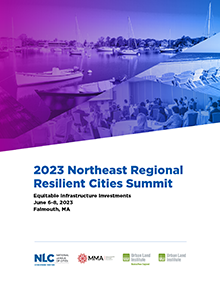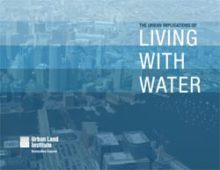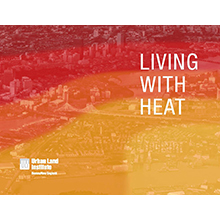ULI Boston/New England is committed to providing resources on a number of resiliency topics for both members and those who are interested in learning more.
Local resources:
2023 Northeast Regional Resilient Cities Summit
Since 2015, the Resilient Cities Summit has offered participants an opportunity to discuss resilience challenges, develop connections with public and private sector leaders, and learn about examples of best practice in preparedness, adaptation and climate mitigation. Now in its sixth edition, the summit convened mayors and council members, senior municipal leaders, and nationally recognized experts in urban development, design, finance and infrastructure to discuss how to achieve more equitable, resilient infrastructure for communities.
The Urban Implications of Living with Water
In addition to the wide collection of political, social, and economic issues that climate change is sparking in our communities, we are faced with physical impacts of rising seas on our built environment. The ideas contained here are representative of the opinions and approaches of 70+ industry experts, including engineers, architects, financial and real estate development professionals, property insurance specialists, and the creators of public policy. These experts met for a day-long conversation to develop integrated solutions for a future with water as a frequent and pervasive part of our daily lives.
Living with Heat
The Living with Heat project is a follow up to ULI Boston’s Living with Water report that was released in 2014. The Project provides design solutions for heat islands in the greater Boston area and is lead by the ULI Boston/New England’s Climate Resilience Committee. The Committee will provide the Metro Boston region with design and policy solutions to tackle the risks and vulnerabilities of rising extreme heat predicted by 2070. The committee chose to work in some of the most vulnerable regions susceptible to heat including East Boston, Lower Roxbury, Somerville, and the Everett/Chelsea border.
ULI Resources
A growing area of research for ULI is the nexus of land use, energy, climate change and real estate. We’re bringing together key players and publishing insightful reports that explore how people invest in energy efficiency, and how cities and metro areas can plan their development to lessen the amount of driving required. Click here for ULI’s Research Center on Climate and Energy.
Follow the links below for reports on drought, wildfire risk, sea level rise, extreme heat, and electrification of the built environment.
REPORT
Resilient Retrofits – Climate Upgrades for Existing Buildings
April 18, 2022
An untold number of buildings are at risk from a changing climate, but resilient retrofit techniques exist for nearly any building type and physical risk. As design knowledge, supportive policy, and financing tools come into greater alignment, resilient retrofits can become mainstream practice, enhancing building value and service life while delivering co-benefits for health and sustainability along the way.
REPORT
Enhancing Resilience through Neighborhood-Scale Strategies
May 24, 2022
This report introduces real estate actors, designers, policymakers, and finance professionals to the opportunities and challenges of preparing existing buildings for accelerating physical climate risks, including extreme temperatures, floods, storms and high winds, seismic risks, water stress/drought, and wildfires.
REPORT
Water Wise: Strategies for Drought-Resilient Development
June 21, 2022
The world is facing unprecedented levels of drought. Drought has extended across over half of the United States in 2022. The frequency, intensity, and duration of droughts are increasing, leading to a myriad of issues, including regional wildfires… and this pattern is expected to continue with climate change.
WEBINAR
Water Wise Strategies for Drought Resilient Development
July 22, 2022
This webinar features some of those strategies for water wise development, landscaping, and policymaking related to land use. Panelists will also discuss how best to bridge the gap between the public and private sectors to advance best practices in water smart development and policies that protect our water future despite projected water shortages, population increases, and climate change
REPORT
Firebreak: Wildfire Resilience Strategies for Real Estate
October 30, 2020
In 2020, the United States had its worst wildfire season on record; these wildfires—as well as the catastrophic events of 2017 and 2018—are remarkable in the scale of their destruction and because many of the fires occurred in or near developed areas. Moreover, climate change is extending the fire season and making the conditions for destructive fires more likely to occur.
REPORT
Disaster and Sea Level Rise Policies and Planning for Equitable Deconstruction & Rebuilding
January 26, 2022
Salvaging building materials keeps valuable and historic building materials in a circular economy instead of landfills; reduces embodied carbon associated with the production, manufacturing, and disposal of building materials; reduces exposure to hazardous dust associated with demolition; and provides meaningful construction job training and access to affordable, local building materials. Yet these benefits are largely untapped by the real estate industry.
REPORT
Staying High and Dry: Public/Private Partnerships Tackling Sea-Level Rise
May 11, 2021
Sea-level rise poses significant threats to global gateway markets from New York City to San Francisco to Washington, D.C., putting countless people and billions of dollars’ worth of property at risk. As the public and local governments gain increased knowledge of what’s at stake, business and real estate leaders are stepping up to partner with the public sector on developing infrastructure plans and policy to address sea-level rise. Beyond developing climate risk strategies specific to their property portfolios or lines of business, these business leaders are strategizing about how to safeguard the economic activity and vitality of their regions. Hear from business leaders on the East and West Coasts who developed new partnerships to address this pressing climate challenge and consider how more cities could leverage business community leadership to address sea-level rise and other environmental hazards.
REPORT
Scorched
January 01, 2019
This report ctors and highlights the leadership and the potential positive impact of the real estate sector in implementing “heat-resilient” building designs and land uses. The report provides an overview of extreme heat’s connections to the built environment and an in-depth discussion of heat mitigation and adaptation strategies related to building design, building materials, green infrastructure and public space design.
REPORT
Electrify: The Movement to All-Electric Real Estate
January 01, 2021
This report report by the Greenprint Center for Building Performance highlights the path towards electrification and what that means for commercial real estate. As more cities pass “gas bans” or carbon emissions reductions goals, and as tenants and residents demand healthy and sustainable spaces, the move to all-electric real estate is important to consider.



